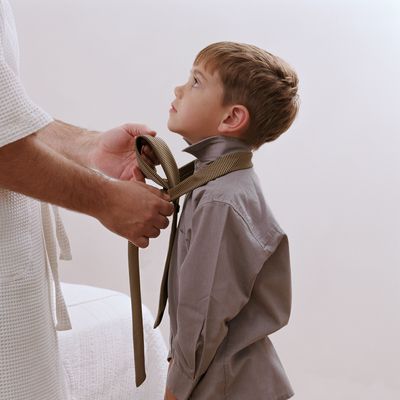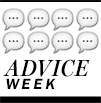
This week, the Cut is talking advice — the good, the bad, the weird, and the pieces of it you really wish you would have taken.
Some years ago, having just failed out of an eight-year relationship, I was informed by my father that the woman I’d end up with would “wear a woven hat, and she would have a basket of fresh eggs in her hands.”
The woman I had until recently dated, and was still massively in love with, could not have resembled this profile less, so, even though my father is not a venturesome person and is not given to oratorical flights of fancy, I nodded indulgently and ignored him. He had been getting it wrong about me for years. This didn’t discourage him, or my mother, from regularly offering insight and guidance — my job was to abide it without erupting. I had learned to do that only recently, and was quite proud of my adult self-restraint.
I’m still unmarried, but several hundred dates — and several summers working on a farm — later, it appears more and more likely that he will turn out to be right. I’ll never look indifferently at a woman in heels, but I have become someone who wants quiet nights at home with a book in my hand and a down-to-earth partner by my side.
These days, I’m on a steady diet of humble pie where my father’s concerned. When I was 17 and brawling with a friend, he told me to let it go and drift away instead of having it out. This was weak-kneed, bourgeois pragmatism, as far as I was concerned — if I were brave, then it would have to be brutal, relationship-imploding truth. Almost 20 years later, I see that he was right, at least when it comes to casual friends — but then how would I have passed the years without all that drama? He was right when he said not to waste time going back to Russia; when he said that kindness matters above all in a person; when he warned me not to spend generosity and trust as cheaply as I was doing because I wanted to be an American believer instead of a Soviet cynic like him; when he … it’s a long list.
I have spent 20 years disagreeing with this man whom I physically resemble so closely that cashiers never have to wonder if we’re together in a checkout line, but with whom my points of emotional convergence were — I thought — heartbreakingly few. But the path I was traveling away from my father turns out to have been a (digressive, overly cerebral, expensively analyzed) circle.
“You’re depressed?” my father said to me during a typically woebegone late-20s stretch. “Why don’t you tear yourself a new asshole doing some labor, and then see how depressed you are?” At the time, I dismissed him as a medieval brute. But these days, after two days a week prepping in a New York City restaurant kitchen, and another two hoeing and haying on a farm in the Hudson Valley, if my heart is not quite solved of itself, it is at least too tired to worry.
All these years, I thought we couldn’t understand each other because my parents had been reared in the Soviet Union, and I mostly here. But when their advice began to make sense, I understood belatedly that our misunderstandings had simply to do with them being parents and me being their child. Some things really are universal.
My father’s advice du jour is about marriage. Very much in keeping with the advice he gave me 20 years ago, he insists that my partner should be, above all, kind. The rest will follow. I desperately want to find a way to feel this way, too, without reservations. Still, it seems too simplistic. I was once the kind of man whose eyes were closed to everything else by physical attraction. Not any more. These days, I find kindness sexy. And yet, I can’t go ahead if there isn’t also passion. But doesn’t the evidence suggest that here, too, my father may be right about sex, and that intellectual spark, not being so important? And that I am about to waste God knows how many more years figuring out a way to believe it? I just don’t know.
For me, being older means knowing more, but that includes knowing more about how little I know. “I think there’s something about the liminal space of one’s 30s,” my ex-girlfriend, now a dear friend, said. “When we’ve become experts in some things, but not others. It’s almost less annoying to just be 22 and not know anything about anything.” (There is that great line by Rilke: “Beware, o wanderer, the road is walking, too.”) So, knowing now all that I don’t, why can’t I heed what seems more and more like wise advice from my parents? Is this a personal deviancy, a compensatory self-assertiveness for having grown up in a stifling political environment, and in a family that valued conformism? A deviancy that perhaps served my creativity, if not my well-being? (“I am glad that I paid so little attention to good advice; had I abided by it I might have been saved from some of my most valuable mistakes.” —Edna St. Vincent Millay) Or are we all simply incapable of taking advice in the emotional realm if our intuition says otherwise? (“You know how advice is. You only want it if it agrees with what you wanted to do anyway.” —John Steinbeck)
I called my mother for advice on taking advice. She was most tickled to hear that I was thinking about all the good advice she and my father gave me and I failed to take. “I’ve heard that there are children out there who listen to what their parents tell them,” she said, stifling a laugh. “But I’ve only heard.” Then I asked her whether there was someone in her life who consistently gave her good guidance, and whether she followed it regardless of her own intuition. “There is,” she said. “And unfortunately not.”
The wrinkle with us is that I’ve been advising my parents as long as they’ve been advising me. I was 9 when we immigrated to America; I learned English the fastest, and quickly became their ambassador to an unfamiliar language and culture — in many ways, the parent to the parents. At a time when most kids are studying their first multiplication tables, I was being asked by my parents how best to approach a city agency that dispensed elder care. And how to deal with a co-worker who liked making ostensibly innocent fun of my mother’s accent. And how to be less afraid.
The more personal the advice — the more it had to do with identity — the less likely they were to take it. In an intimate variation on the classic Soviet saying “We pretend to work and they pretend to pay us,” my parents and I pretend to take each other’s advice and keep asking for more, even as time tends to prove the other side correct. How to explain this ageless, self-thwarting stubbornness? Family, I guess.





